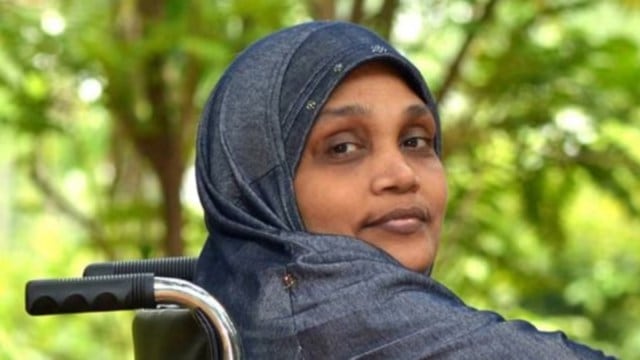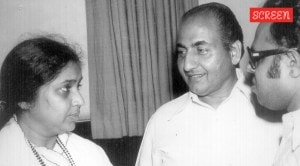Stay updated with the latest - Click here to follow us on Instagram
K V Rabiya: Kerala’s literacy hero who fought several odds and still stands strong
Struck by polio herself, K V Rabiya, Padma Shri awardee and literacy activist from Kerala fought several odds since her early days and played a key role in the literacy campaign in the state in the 1980s. She started six schools for children with special needs and trained and empowered more than 250 women through a small-scale manufacturing unit.
 Rabiya’s contribution to Kerala’s literacy mission in the 1990s left an indelible mark on the development of Malappuram. (File)
Rabiya’s contribution to Kerala’s literacy mission in the 1990s left an indelible mark on the development of Malappuram. (File)Women often receive a lot of encouragement to scale new heights nowadays, but that was not the case always. Decades ago, a specially-abled woman from Vellilakkad in Kerala’s Malappuram had to fight physical ailments and social stigma, among others, in her quest to contribute to society.
But despite facing challenges, K V Rabiya , who was awarded the Padma Shri for social work in 2022, remained resolute in her endeavour to work for social welfare. Rabiya’s contribution to Kerala’s literacy mission in the 1980s left an indelible mark on the development of Malappuram. Her life and achievements have also found space in the textbooks for MA students at Calicut University, among others.
M N Karassery, Malayalam writer, said Rabiya inspired countless people, especially women. “It has been over 25 years since she has been teaching. She began to educate people in the backward areas of the district. Malappuram was not so developed then… she ventured into pockets and educated the residents. The remarkable factor is that she is a specially-abled woman from the Muslim community. Now, literacy is a common thing and people barely talk about it. However, fighting the odds at that time deserves recognition. At a time, when women in the Malabar region are fighting for equal inheritance rights and equal seats in the Kerala Legislative Assembly, remembering Rabiya is inevitable,” he said.
Children’s Rabiyatha
Struck by polio at the age of 14, Rabiya mustered the courage to continue school. In her translated autobiography, Dreams Have Wings, Rabiya mentions how the zestful girl who used to have fun climbing trees was left shattered by the illness.
“Slowly, I felt like my legs were shivering. I told myself that it was just an illusion. ‘Nothing to worry’, I comforted myself,” Rabiya says, mentioning that she fell down on her way to school at the onset of polio. However, she managed to complete her Class 10. Even though she wanted to study further after the pre-degree course, her physical ailment confined her to home.
The spirited girl continued to read books voraciously. Later, she started taking tuition classes and was fondly called ‘children’s Rabiyatha’ (elder sister). Students started flocking to her house from far-flung places. She taught most students for free while charging a nominal fee for financially sound students.
Literacy mission
When the then-state government started the Literacy Mission in the 1980s, Rabiya was enthusiastic to teach her fellow community members. However, an instructor needed to have a college degree or formal education.
But all of a sudden, an instructor in her area, Subair, sought her help. As Subair’s exams were going on, he could not concentrate on the Mission’s classes and the responsibility to take the classes was given to Rabiya.
When started her classes on June 17, 1990, there were only seven students. Elderly women, housewives later gathered around out of curiosity. Rabiya recollected how hard it was to convince people, especially women from her community to study. She explained about the importance of literacy and illustrated examples of Abraham Lincoln, Kasthurba Gandhi and VT Bhattathirippaad to inspire them. Slowly, scores of people joined for classes and without taking a break, Rabiya taught them everyday.
“My learners and I never liked to come second! We must come first – that was our motto. There were dark nights when we used to team up around a kerosene lamp, gearing up for such competitions,” Rabiya mentioned in her autobiography.
Rabiya taught her students with dedication and even won the praise of then IAS officer Kuruvilla John. Speaking to indianexpress.com, Rabiya said, “I was very strict… I struck down answers until students wrote them impeccably. During an examination, I remember how another instructor was left astounded by the uniformity in my students’ neat writing.”
Sharing an anecdote in her autobiography, Rabiya recalled how her fiery speech during bureaucrat John’s visit to her class, resulted in road and electricity connection in the area. The road was later named Akshara Road.
She also contributed to setting up a library in Vellalikkad and a separate reading room for women. Rabiya soon ventured into other social activities.
Rabiya led awareness campaigns on women’s empowerment, infant mortality rate, and consumer rights. Her contributions led to the formation of Mahila Samajam, a group that works for the benefit of women from backward classes. Rabiya also played a major part as the convener of Aksharasangham, a government scheme targeted to make people aware of various welfare schemes. Chalanam, her charity organisation, continues to strive for the welfare of the disabled through rehabilitation and training programs. Rabiya also set up six schools for disabled children.
Fighting odds
Talking about challenges faced by specially-abled people, the 58-year-old woman said, “There should be reservations in jobs for the specially-abled. They should be able to avail the best treatment and more avenues of education. For those who are confined to home, resources and training should be made available in their houses. They should be equipped to gain skills and earn a livelihood.
“When a person faces adversity, they become stronger. If one loses both legs, then he or she uses their hands to move. When I am lying down, I am a bedridden woman. But, when I move into a wheelchair, I become a social worker. Still, I manage everything and continue to do my work.”
Rabiya was left paralysed from the neck down since the age of 38 after falling down in the bathroom. Before that, at the age of 32, she was diagnosed with breast cancer and underwent surgery, chemotherapy, and radiation.
“I have endured all adversities by concentrating on education… I write books and do many other things to keep myself motivated,” concluded the social worker.







